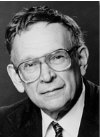
John Hospers has lived a somewhat quieter life than a philosophical action hero like Jack Wheeler.
Jack Wheeler has climbed the Matterhorn, read Aristotle atop a pyramid, skydived into the North Pole, lived with headhunters, and written a thesis on Greek ethics. But only Dr. John Hospers can lay claim to the most exhilarating, daring, and death-defying adventure of all: sustained and critical philosophical discourse with novelist-philosopher Ayn Rand.
When Hospers met Rand in 1961, he was suffering from philosophical "tired blood." Their brief friendship revitalized him. "She renewed my confidence in my profession,"1 Hospers would tell the international Objectivist newsletter Full Context. A confidence that "has continued to this day."2
"You are in the most important profession in the world!" Rand told him. "What you are handling is dynamite. If it is not well handled, it could destroy the world!"3
Like everybody who knew Rand, Hospers remembers the eyes: "[T]hose eyes that (I fancied) could penetrate through walls, and that mind so perceptive as to discern at a glance any remnant of self-excuse or rationalization. One's face must not display even one small pimple of dishonesty, especially with oneself, else the wrath of God would be tame by comparison. ... It was a totally new experience for me—the systematic character of her thought, together with her childlike benevolence, the keen piercing eyes, the deep voice which could warm and freeze you by turns—and the uncompromising rigor of her argument."4
His evenings with Ayn Rand were "among the most intellectually exhilarating of my life. Sometimes the sun would be up when we closed up shop, and I would drive to my class in Brooklyn almost in a daze."5
Unlike most of Rand's intellectual companions of those years, Hospers was no "student of Objectivism," no callow youth to be intellectually molded by her will.
Their largest area of "intelligent agreement" seemed to be in aesthetics (Hospers has authored a text on the subject, Understanding the Arts). And Rand relished Hospers' astute praise of Atlas Shrugged, a perceptiveness of response she found hard to come by during those years.
As for politics, Hospers wasn't exactly a libertarian when he met Ayn Rand, but he largely came around to her way of thinking in that area.
He had more questions when it came to ethics and epistemology. Indeed, it is clear from the electric correspondence that passed between them, some of it published in The Letters of Ayn Rand, that he played a crucial role in her intellectual development. Many of her letters—answering objections raised by Hospers—are virtually first drafts of later essays. His impact on Rand's thought has still not been adequately credited by scholars of her work.
There is one fond memory of her that above all I shall never forget. When we had our long discussions, and I would finally leave her apartment, whether it was 4 in the morning or 6 or 8, I would go into the hall and ring for the elevator, and she would stand in the doorway and throw me a kiss, saying not "Good night," but rather (something only she would say) "Good premises."
In the ensuing years I have meditated often on those words of farewell, which were also a continuing challenge. I could not claim, but only hope, that I have been able to live up to them. Throughout these years I have hardly been able to remember this little recurring gesture, and its accompanying words, without being reduced to tears.6
Full Context Interview with John Hospers
Full Context Memoir of his friendship with Ayn Rand
Hospers as 17-year-old professor of astronomy
In sixth grade I read every article on astronomy in the school's World Book Encyclopedia, and then borrowed every book on astronomy that the city library had. I would figure out when different stars and planets would rise, and stay up at night waiting for it to happen. The laws of physics and astronomy never let me down. ... When I got to college ..., the dean, who taught astronomy, delegated the job of teaching it to me.7
Favorite scene in Atlas Shrugged
I guess I'd have to say the scene between Dagny and the tramp in the train, on what happened to Twentieth Century Motors, and why. It's such a great literary piece—and it presents, as she does so well, the consequences of acting on certain ideas—in this case "To each according to his ability, to each according to his need." When I finish reading those ten pages aloud to the class, half of them don't understand it or don't care, and the other half is thunderstruck—they have been hit over the head with new ideas, which they have never heard before, and they don't quite know how to handle it or what to do about it. Many a future Objectivist has taken root from that reading in my class—and I've done it annually for about thirty years.8
Copyright © 2000, The Daily Objectivist - Reprinted with permission of The Daily Objectivist and Davidmbrown.com.
19 Jan 2009 (last edit: 17 Jan 2024)
You can assist the work of Freedom Circle by purchasing one of the works discussed above:
-
John Hospers, "Memories of Ayn Rand", Full Context, Vol. 10, No. 9, May 1998. (Freedom Circle note) ↩︎
-
Ibid. ↩︎
-
Ibid. ↩︎
-
Ibid. ↩︎
-
Ibid. ↩︎
-
Ibid. ↩︎
-
Karen Minto, "Interview with John Hospers", Full Context, Vol. 10, No. 9, May 1998. (Freedom Circle note) ↩︎
-
Ibid. ↩︎
